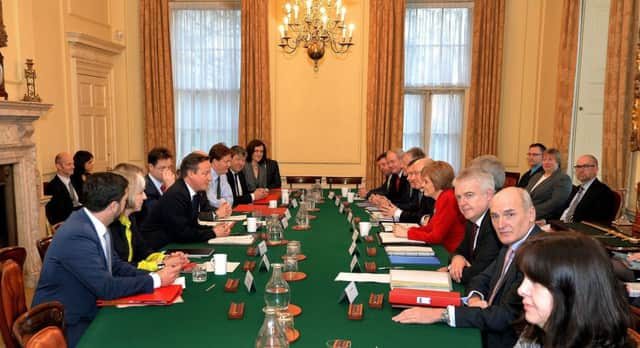Allan Massie: What next for the Barnett Formula?


Someone who had moved from “No” to voting “Yes” in September remarked to me the other day that while she wasn’t that keen on independence she was tired of bad government from Westminster. Fair enough, I thought, we all have our opinions about what is good or bad government, but what about bad government from Holyrood?
Take, for instance, the Named Persons proposal. Suppose, just, suppose, that this had come from Westminster. Suppose David Cameron had decreed that every child and young person should have a state-appointed guardian. Wouldn’t there have been squawks of protest – even from self-styled “progressive Scotland”? Mightn’t such a proposal, with its disregard for parental duties and authority, have been denounced on account of the underlying assumption that children and young people are first of all the responsibility of the state rather than of their parents or indeed other members of their family? I am pretty sure that would have been the response here. But of course there has been no such proposal from Westminster. It’s a Holyrood measure brought forward by the SNP – and so self-styled progressive Scotland seems mostly to be quite happy with it. What would have been denounced as bad government if such a scheme had emanated from Westminster is absolutely OK since it comes from Holyrood. “Four legs good, two legs bad,” as Orwell’s animals were taught to chant.
Advertisement
Hide AdAdvertisement
Hide AdWell, this is fair enough actually. Judgment of what is good or bad in government is not always based on an objective consideration of the merits of a measure. People tend to approve or disapprove according to the origins of a measure and who brings it forward. If you think “Westminster bad, Holyrood good” – or vice versa – your judgment is likely to be coloured by that opinion. Of course in one sense it’s aye been like that – “Tories good, Labour bad”, or the other way round – but now that the UK is less of a unitary state than it used to be, there is a new complication.


We in Scotland have had 16 years to come to terms with this. South of the old Border it’s different. The electorate in England is only just waking up to the reality of the constitutional change that has taken place. One might go further and say that English politicians are only just realising what Westminster did when it passed the Scotland Act in the first year of the 1997 Labour government. Up till recently there’s been no great need for them to do so. There was only a handful of SNP members of the House of Commons, and they could generally be disregarded, all the more so because they took a self-denying ordinance and neither spoke or voted on matters which they regarded as concerning only England. But with a larger number of SNP members things will be very different.
David Cameron responded to the Smith Commission’s proposals for a further devolution of powers to Holyrood by raising the question of Evel – English votes for English laws. I would guess that this seems quite reasonable to a majority of people in England: sauce for the goose, they might say, is sauce for the gander. Why should the Scots have a say on education or the health service in England when the English have no say on laws relating to these matters in Scotland? But there are complications, as not only the SNP has been quick to point out. The working of the Barnett Formula means that measures passed on such questions relating to England have financial consequences for Scotland. Nevertheless this – and the old West Lothian Question as generally understood – are problems that aren’t going to disappear. It’s no longer even barely credible to say that the best answer to the West Lothian Question is to ignore it.
No matter the result of next week’s election, and no matter who forms the next UK government, we are in for further constitutional change. The consequences for Westminster and England of devolving power and responsibility to Scotland, Wales and Northern Ireland are at last going to have to be examined. People will shrink from doing so because there are no easy or comfortable answers; the kerfuffle that followed Cameron’s talk of Evel is proof of that . But so is the prominence in this election of Scotland’s First Minister, Nicola Sturgeon, for this is, I think, unprecedented. Here you have someone who is not a candidate for a seat in the House of Commons declaring who she will support as prime minister of the United Kingdom and how she intends to influence and, by implication, control the next UK government. She will “lock David Cameron out of Downing Street” even if he has a bigger majority of seats in England than she now has of seats in the Scottish Parliament.
Sorting out the constitutional difficulties that have been created by devolution is not going to be easy. It may even be impossible because, whatever Ms Sturgeon may sometimes say about working for the better government of the UK, it is not in the interest of the SNP that the British constitution should be reformed and made to work better. Indeed it’s in their interest that it shouldn’t. It may be that a fair number of English politicians think likewise; they would be quite happy to see Scotland break away. Given what we now know about the probable fiscal deficit that a Scottish Government would face in an independent Scotland, this should alarm all but the most completely committed of SNP voters. Be careful what you wish for; you may get it.
Be that as it may, Unionists of all parties have a duty to address the constitutional question. This must be done if the Union is to survive, albeit in a revised and much looser form. The incoming government should make this a priority, and the first step should be the creation of an all-party constitutional convention. Will this happen? It should, because the old adage “let sleeping dogs lie” no longer holds good. The dogs have woken up; they are on their feet growling and barking. If we want good government for all the constituent parts of the UK, Westminster must take note and take the lead.